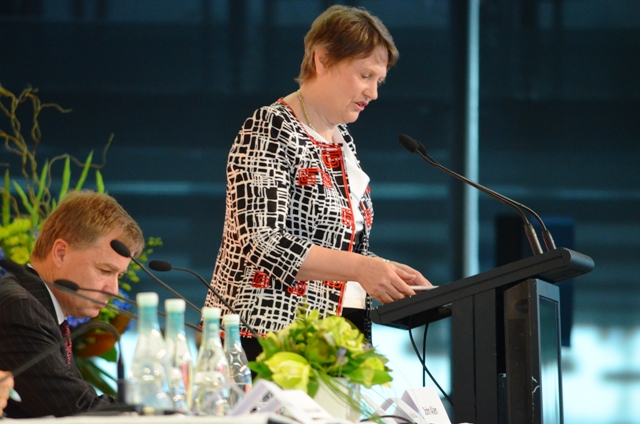
25 March 2013, Auckland, New Zealand - A Pacific island renewable energy project coordinated by the Secretariat of the Pacific Regional Environment Programme (SPREP) adopts the partnership approach to help 11 island countries overcome barriers to achieving renewable energy.
Starting in 2007 and ending in December 2014, this project valued at 5.25 million dollars works as "many partners, one team". It was during the Pacific Energy Summit in Auckland that the Director-General of SPREP shared the lessons learnt five years after the project began.

"Political leadership in achieving renewable energy is important, we have seen this in the region with high level commitments for ambitious targets," said Mr. Sheppard.
"Also needed to support these commitments are clear and effective legislations, policy and strong institutions. Financing must be stepped up, in particular the investment must be long term and sustainable."
Through the Pacific Islands Greenhouse Gas Abatement through Renewable Energy Project (PIGGAREP), the region will collectively reduce greenhouse gas emissions by 30% by 2015.
The Project is funded by the Global Environment Facility and co-financing partners. The United Nations Development Programme multi-country office in Samoa is the principal project representative.
In 2011 the Sustainable Energy for All initiative was launched by UNDP to transform the world's energy system by strengthening the partnerships between governments, private sector and civil society. The goal is to double the rate of improvement in energy efficiency by 2030 through providing universal access to energy services and increase global use of renewable energy.

"In less than 18 months, some 70 developing countries have come on board, and sustainable energy is high on the international agenda," said Ms. Helen Clark, Administrator of the UNDP as she addressed delegates at the Pacific Energy Summit during a panel that provided a global perspective on energy use.
"National energy action plans and bottom up initiatives are already in formation, with countries ensuring at every step that actions meet local needs."
The PIGGAREP uses the partnership approach to ensure local needs are met. Work in The Cook Islands, Fiji, Kiribati, Nauru, Niue, Papua New Guinea, Samoa, Solomon Islands, Tonga, Tuvalu, Vanuatu is conducted by a country team that coordinates the activities at the national level while a regional energy working group is the forum for PIGGAREP to work on activities with regional partners. Close cooperation and collaboration on renewable energy initiatives in the region is also fostered.
"We have also learnt through the PIGGAREP that we need to tailor renewable energy to meet our needs," said David Sheppard, "the region has issues of remoteness and a changing climate. There is a need for Pacific solutions for Pacific problems and it can work, we have many Pacific renewable energy success stories."
The Pacific Energy Summit is taking place at the Viaduct Events Centre, Auckland, New Zealand from 24 – 26 March, 2013.